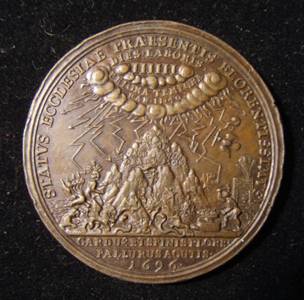Treasure Chest Still Kept Back from God’s People.” The various legends allude indirectly to Shabbatai Tzvi, using biblical quotations referring to the Sabbath in mockery of the name Shabbatai, a type of contrivance Wermuth has used with other of his anti-Semitic medals.
Given Wermuth's other related works, another possible reason for this medal's creation may have to do with the Ottoman Empire's decline at the hands of Christian Europe at this time. With his references to passages in the Old and New Testament on this medal, Wermuth may have interpreted religious meanings for the Ottoman decline (Ben-Arieh).


Figure 25. Shabbatai Tzvi Medal
Christian Wermuth, Germany, 1696, Bronze struck medal, 43mm. Ref: Kirschner 32; Feille 3429 and plate XI; Friedenberg pp.77/78 and 139. (Image courtesy of Alex Ben-Arieh)
An inscription on the edge (not seen) of the Shabbatai Tzvi medal (figure 25) TEMPVS PRAESENS ESAV / FVTVRVM JACOB, (Present Time Esau, Future Jacob) refers to the biblical story of Esau and Jacob, twin brothers of Isaac and Rebecca, who competed for the inheritance of their father. According to Genesis 25, Jacob, the younger of the twins, tricked his blind father into blessing him with his inheritance, leading to conflicts between the brothers. Ultimately, Esau married two Hittite women in violation of Abraham's injunction not to take wives from among the Canaanite population, forever ruling out Esau as the bearer of patriarchal continuity. Jacob received Isaac's blessing and, with his name changed to Israel, is declared Isaac's legitimate heir in the continued founding of the Jewish people. Thus, with this inscription, Wermuth alludes to the ephemeral nature of some religions, as while Jacob is considered to be one of the patriarchs of the Israelites, his brother Esau is the progenitor of the Edomites, a group which after a time disappeared from history.
 |
 |
 |
 |
© 2000-2011 Jewish-American Hall of Fame © 2012-2015 American Numismatic Society All Rights Reserved by Benjamin Weiss